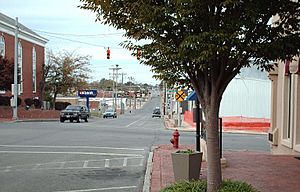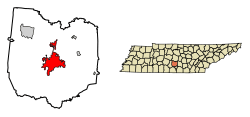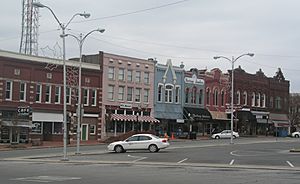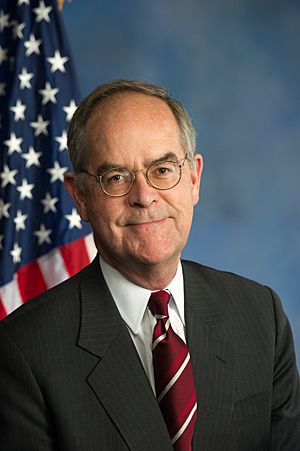Shelbyville, Tennessee facts for kids
Quick facts for kids
Shelbyville
|
|
|---|---|

Downtown Shelbyville
|
|
| Nickname(s):
The Walking Horse Capital of the World and The Pencil City
|
|

Location of Shelbyville in Bedford County, Tennessee.
|
|
| Country | United States |
| State | Tennessee |
| County | Bedford |
| Platted | 1810 |
| Incorporated | 1819 |
| Named for | Isaac Shelby |
| Area | |
| • Total | 18.44 sq mi (47.76 km2) |
| • Land | 18.44 sq mi (47.76 km2) |
| • Water | 0.00 sq mi (0.00 km2) |
| Elevation | 755 ft (230 m) |
| Population
(2020)
|
|
| • Total | 23,557 |
| • Density | 1,277.56/sq mi (493.27/km2) |
| Time zone | UTC-6 (Central (CST)) |
| • Summer (DST) | UTC-5 (CDT) |
| ZIP codes |
37160-37162
|
| Area code(s) | 931 |
| FIPS code | 47-67760 |
| GNIS feature ID | 1269993 |
Shelbyville is a city in Tennessee, and it's the main town of Bedford County, Tennessee. It was first planned out in 1810 and officially became a city in 1819. In 2020, about 23,557 people lived there. Shelbyville is famous for the Tennessee Walking Horse industry. People often call it "The Walking Horse Capital of the World."
Contents
Where is Shelbyville Located?
Shelbyville is in the middle part of Tennessee. It sits on a high limestone bluff next to the Duck River. This river flows around the southern and eastern sides of the city.
The city covers about 47.76 square kilometers (18.44 square miles) of land. There is no water area within the city limits.
Who Lives in Shelbyville?
Shelbyville has grown a lot over the years. Here's how its population has changed:
| Historical population | |||
|---|---|---|---|
| Census | Pop. | %± | |
| 1850 | 1,708 | — | |
| 1860 | 776 | −54.6% | |
| 1870 | 1,719 | 121.5% | |
| 1880 | 1,869 | 8.7% | |
| 1890 | 1,823 | −2.5% | |
| 1900 | 2,236 | 22.7% | |
| 1910 | 2,869 | 28.3% | |
| 1920 | 2,912 | 1.5% | |
| 1930 | 5,010 | 72.0% | |
| 1940 | 6,537 | 30.5% | |
| 1950 | 9,456 | 44.7% | |
| 1960 | 10,466 | 10.7% | |
| 1970 | 12,262 | 17.2% | |
| 1980 | 13,530 | 10.3% | |
| 1990 | 14,049 | 3.8% | |
| 2000 | 16,105 | 14.6% | |
| 2010 | 20,335 | 26.3% | |
| 2020 | 23,557 | 15.8% | |
| Sources: | |||
Shelbyville's Population in 2020
In 2020, there were 23,557 people living in Shelbyville. These people lived in 7,257 households, and 5,025 of these were families.
The city is home to people from many different backgrounds:
| Group | Number of People | Percentage of Total |
|---|---|---|
| White (not Hispanic) | 13,156 | 55.85% |
| Black or African American (not Hispanic) | 2,942 | 12.49% |
| Native American | 65 | 0.28% |
| Asian | 173 | 0.73% |
| Pacific Islander | 10 | 0.04% |
| Other/Mixed | 1,045 | 4.44% |
| Hispanic or Latino | 6,166 | 26.17% |
What is Shelbyville's Economy Like?
Shelbyville is known as "The Pencil City." This is because it used to be a major center for making wood-cased pencils. Even today, writing tools are still made here.
For example, Sanford Corporation used to make the Sharpie marker in Shelbyville. The Sharpie is the best-selling writing tool in the world. In 1991, the world's longest pencil was made in Shelbyville. It was 1091 feet long and weighed 27 pounds!
One of the last four pencil makers in the United States, Musgrave Pencil Company, is still in Shelbyville.
Other big businesses in Shelbyville include manufacturers like Calsonic Kansei, Newell Rubbermaid, and Jostens. There's also a Tyson Foods facility and a distribution center for Wal-Mart. Several trucking companies also have operations here.
How Do People Get Around?
Shelbyville is located where two important roads meet: U.S. Route 231 and U.S. Route 41A.
The city also used to have a train line. This line connected Shelbyville to Wartrace and was part of the Saint Louis, Nashville and Chattanooga Railroad.
The Tennessee Walking Horse National Celebration
Shelbyville is famous for the Tennessee Walking Horse National Celebration. This big event happens every year for 11 days before Labor Day. It's the largest show for the Tennessee Walking Horse breed.
During the Celebration, the best horses are named World Grand Champion and World Champions. It's a huge festival where over $650,000 in prizes are given out. The Celebration started in 1939, and the first winner was a horse named Strolling Jim.
Learning and Education in Shelbyville
Schools for Kids (K-12)
The Bedford County School District runs the schools for younger students. Shelbyville Central High School is the public high school for the area.
After slavery ended in the United States, the AME Church opened a school for African-American children. The public school system had its first Black graduates in 1890. Schools like East Bedford School and Bedford County Training School for Negroes (also known as John McAdams High School and Harris High School for Negroes) served African-American students. Schools in Shelbyville became racially integrated after 1964.
Colleges and Higher Education
The Tennessee College of Applied Technology - Shelbyville is a place where students can learn job skills. It's part of the Tennessee Board of Regents System, which is one of the largest higher education systems in the country.
Shelbyville was also once home to Turner College. This college was started in 1885 for African-American students. It offered high school classes, teacher training, and industrial skills. The college closed in the late 1920s.
News and Media in Shelbyville
Shelbyville has local news sources to keep people informed. The Bedford County Post started in August 2023 after the Shelbyville Times-Gazette closed.
You can find news from Shelbyville at "Bedford County Post" (www.bedfordcountypost.com) and the Shelbyville Times-Gazette.
Famous People from Shelbyville
Many interesting people have connections to Shelbyville:
- Jim Cooper (born 1954) is a Democratic Congressman. His family owns historic homes in Shelbyville. His great-great-grandfather, Jacob Morton Shofner, built the River Side Farmhouse in 1890. His grandfather, William Prentice Cooper, who was mayor of Shelbyville, built the Gov. Prentice Cooper House in 1904. Jim's father, Prentice Cooper, was born in the River Side Farmhouse and served as Governor of Tennessee from 1939 to 1945.
- Robert Galbraith Allison (1897-1952) was a director in the State of Tennessee's budget department.
- Sumner Archibald Cunningham (1843-1913) was the first editor of the Confederate Veteran magazine. He is buried in Shelbyville's Willow Mount Cemetery.
- Dickie Gardner is a well-known horse trainer.
- Joe Jenkins was a Major League Baseball player.
- Harold A. Katz (1921-2012) was an Illinois state representative and a lawyer.
- Sondra Locke (1944–2018) was an actress and director.
- Judy and Joe Martin are a married couple who trained horses together.
- Joyce Paul (1937–2016) was a country music singer.
- Ernest A. Pickup (1887-1970) was a printmaker.
- Samuel Escue Tillman (1847–1942) was a U.S. Army officer. He was also the superintendent of the United States Military Academy at West Point, New York.
Images for kids
See also
 In Spanish: Shelbyville (Tennessee) para niños
In Spanish: Shelbyville (Tennessee) para niños
 | Valerie Thomas |
 | Frederick McKinley Jones |
 | George Edward Alcorn Jr. |
 | Thomas Mensah |





